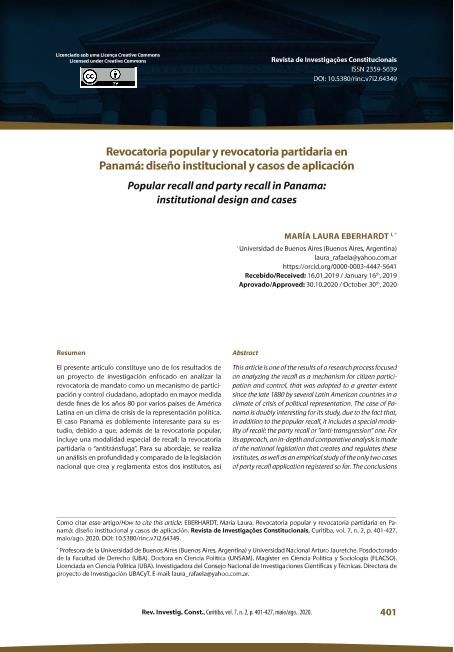Mostrar el registro sencillo del ítem
dc.contributor.author
Eberhardt, Maria Laura

dc.date.available
2022-10-03T14:33:07Z
dc.date.issued
2020-11
dc.identifier.citation
Eberhardt, Maria Laura; Revocatoria popular y revocatoria partidaria en Panamá: diseño institucional y casos de aplicación; Universidade Federal do Paraná; Revista de Investigações Constitucionais; 7; 2; 11-2020; 401-427
dc.identifier.issn
2359-5639
dc.identifier.uri
http://hdl.handle.net/11336/171456
dc.description.abstract
El presente artículo constituye uno de los resultados de un proyecto de investigación enfocado en analizar la revocatoria de mandato como un mecanismo de participación y control ciudadano, adoptado en mayor medida desde fines de los años 80 por varios países de América Latina en un clima de crisis de la representación política. El caso Panamá es doblemente interesante para su estudio, debido a que, además de la revocatoria popular, incluye una modalidad especial de recall: la revocatoria partidaria o “antitránsfuga”. Para su abordaje, se realiza un análisis en profundidad y comparado de la legislación nacional que crea y reglamenta estos dos institutos, así como un estudio empírico de los dos únicos casos de aplicación de revocatoria partidaria registrados hasta el momento. En las conclusiones se sintetizan los alcances y limitaciones de la existencia y uso de la revocatoria como un instrumento de profundización democrática.
dc.description.abstract
This article is one of the results of a research process focused on analyzing the recall as a mechanism for citizen participation and control, that was adopted to a greater extent since the late 1880 by several Latin American countries in a climate of crisis of political representation. The case of Panama is doubly interesting for its study, due to the fact that, in addition to the popular recall, it includes a special modality of recall: the party recall or “anti-transgression” one. For its approach, an in-depth and comparative analysis is made of the national legislation that creates and regulates these institutes, as well as an empirical study of the only two cases of party recall application registered so far. The conclusions summarize the scope and limitations of the existence and use of the recall as an instrument of democratic deepening.
dc.format
application/pdf
dc.language.iso
spa
dc.publisher
Universidade Federal do Paraná
dc.rights
info:eu-repo/semantics/openAccess
dc.rights.uri
https://creativecommons.org/licenses/by/2.5/ar/
dc.subject
REVOCATORIA POPULAR
dc.subject
REVOCATORIA PARTIDARIA
dc.subject
PANAMÁ
dc.subject
PARTICIPACIÓN Y CONTROL CIUDADANO
dc.subject
DEMOCRACIA DIRECTA
dc.subject.classification
Ciencia Política

dc.subject.classification
Ciencia Política

dc.subject.classification
CIENCIAS SOCIALES

dc.title
Revocatoria popular y revocatoria partidaria en Panamá: diseño institucional y casos de aplicación
dc.title
Popular recall and party recall in Panama: institutional design and cases
dc.type
info:eu-repo/semantics/article
dc.type
info:ar-repo/semantics/artículo
dc.type
info:eu-repo/semantics/publishedVersion
dc.date.updated
2022-09-29T18:01:22Z
dc.journal.volume
7
dc.journal.number
2
dc.journal.pagination
401-427
dc.journal.pais
Brasil

dc.journal.ciudad
Curitiba
dc.description.fil
Fil: Eberhardt, Maria Laura. Consejo Nacional de Investigaciones Científicas y Técnicas; Argentina. Universidad de Buenos Aires; Argentina
dc.journal.title
Revista de Investigações Constitucionais
dc.relation.alternativeid
info:eu-repo/semantics/altIdentifier/url/https://revistas.ufpr.br/rinc/article/view/64349
dc.relation.alternativeid
info:eu-repo/semantics/altIdentifier/doi/http://dx.doi.org/10.5380/rinc.v7i2.64349
Archivos asociados
